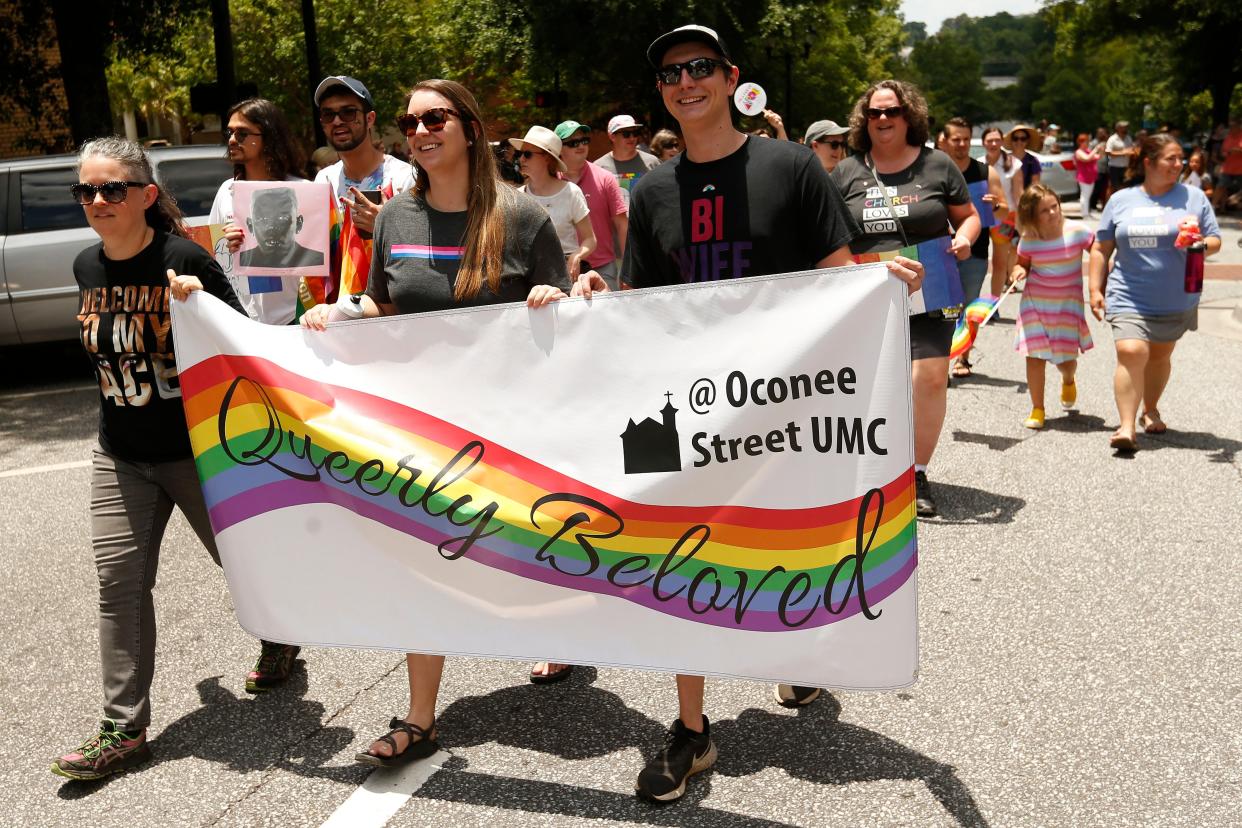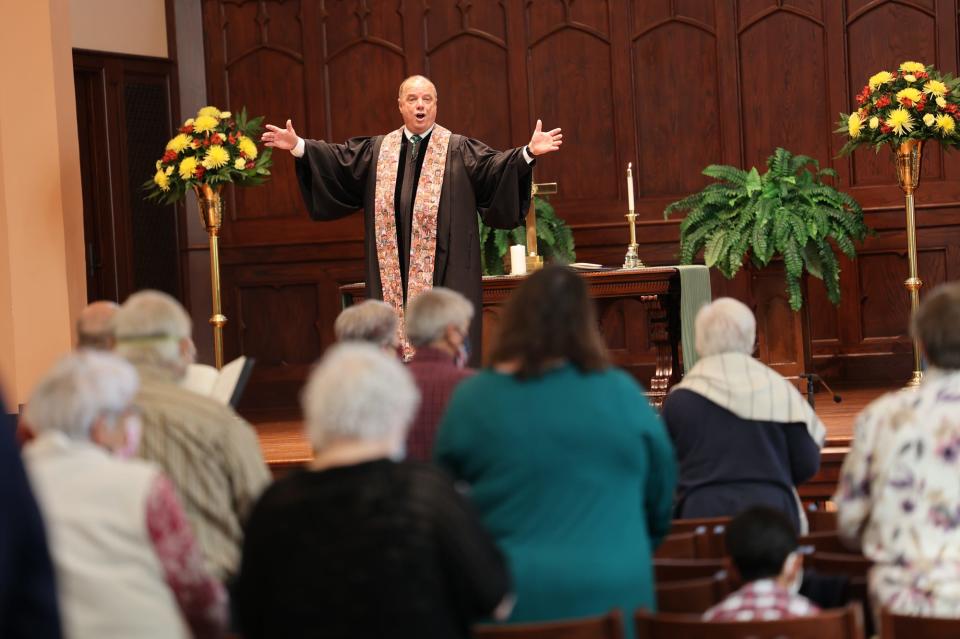Georgia’s Methodists face growing divide over tradition, LGBT inclusion

The 2022 North Georgia United Methodist Conference held this month in Athens went as typically planned — music, panels and fellowship. But there was a somber moment on the first day of conference proceedings.
Conference members on June 2 voted to allow 70 churches — 9% of the NGUMC — to leave the United Methodist Church entirely. Four days later, 18 churches with the South Georgia Conference chose to disaffiliate.
The NGUMC published a list of the departing churches that same day. Some blamed LGBT issues for their disaffiliation; others blamed the UMC’s changing membership. Others still, like Quest Church in Grovetown, Georgia, decried the “intensifying division” within the denomination.
Read more: 70 Methodist churches choose to disaffiliate from North Georgia Conference
The future of these churches remains equally uncertain. Some churches will dissolve, some will strike out as independent congregations and some will go on to join the brand-new, ultra-orthodox denomination the Global Methodist Church.
Amidst rapid change, Georgia’s Methodist community — conservative, progressive and moderate — is struggling to make sense of the road ahead.
Regardless, faith leaders like the Rev. Laura Patterson with Oconee Street United Methodist Church in Athens knew this was a long time coming.
“We’re at the point where we’re all waiting to sign the divorce papers,” she said. “Some folks are going to go, and that’s probably best for all of us.”
Exodus
What Dan Parr wants people to know is that the division goes deeper than disagreements over sexual orientation.
"We’re dividing because of the broken connectional covenant we have, which flows from our differing views of the authority of scripture, the interpretation of scripture, and how to live out our faith based on that. That is the reason we’re dividing,” he said. “Human sexuality is the presenting issue, but it’s a subset of that.”
Parr is chapter president of the North Georgia Wesleyan Covenant Association, a lobbying group advocating for a more orthodox UMC. He wants the UMC to hew closer to its traditional doctrine, including its rules on LGBT church members.
The Book of Discipline, which is the key book of law for the UMC, states “practicing, self-avowed homosexuals” cannot become ministers, assume leadership roles or get married. There is no explicit reference to transgender people.
Though the Book of Discipline is regularly revised, recent attempts to make the doctrine less restrictive have failed. During an historic conference in 2019, UMC members rejected a plan to ease these limits and doubled down on defining and excluding LGBT Methodists.
Nevertheless, conservative Methodists remain frustrated with the denomination, and are now opting to leave it altogether. Last month, one group launched the Global Methodist Church, a denomination with orthodox Methodist principles like prohibiting gay marriage and ordination. Though the UMC currently forbids regional chapters from joining, individual churches and conferences outside the United States have already started to abandon the UMC for the GMC.
What’s more, Parr said, this is only the first wave. The disaffiliation of regional chapters will be up for discussion at the next denominational conference, which has been postponed until 2024. Parr believes many more churches will choose the GMC over the UMC.
“Where [the UMC] has gotten off the rails is where the church has failed to follow the scripture and instead followed the culture,” he said. “And so, what we’re saying is everyone is welcome, but there are certain roles that are defined for us — such as male and female, such as marriage, such as ordination.”
"A continually evolving thing”
Patterson sees it differently. Her ministry in Athens largely revolves around the spiritual needs of queer and trans people, from running monthly support groups to marching in the first Athens Pride Parade. She believes culture has always played a pivotal role in Methodism.
“Anything that’s happening in American politics writ large makes its way into the UMC,” she said. “[Lately] it’s been played out on the bodies and souls of LGBTQ people, which is wildly unfair and unjust.”
The debate over LGBT rights is one of many ruptures in the history of Methodism. During the Civil War, the church divided along the lines of slavery and abolition. Once reunified, it went on to splinter again in the 20th century over segregation and women’s rights.
To her, these debates are not just skirmishes in the culture wars: They alienated followers of Christ from the Methodist tradition. Patterson wishes conservative Methodists would realize the impact of their rejection on LGBT Methodists.
“I don’t think they see the hurt they’re causing,” she said.
Patterson also pointed out the innate flexibility of the Methodist tradition. Every four years, the United Methodist Church gathers to rewrite its doctrine. While some practices are not subject to change, the approach to sexuality and gender identity very much is. Many long-accepted traditions have been updated in the past — for example, the restriction on women becoming Methodist ministers. Patterson asked: Does aligning with tradition include retracting that revision?
“How we practice our faith is a continually evolving thing,” she said. “So, if they fully accept gay people, why are they not advocating to change the Book of Discipline?”

The first to go
These 70 churches are not the first to depart the UMC over LGBT inclusion. Asbury Memorial Church in Savannah exited in 2020. The referendum at the annual conference was the final limit. By then, the Rev. Billy Hester and his church family — one-third of whom, he estimates, are LGBT — had grown weary of waiting for the church to accept LGBT people.
“It’s all just a talk issue for these other people,” he said. “But it’s the lives of my members that are affected.”
GMC leadership stated that the UMC likely will grow more inclusive in the absence of its conservative base. Hester thinks that is a possibility.
“But at the same time, you just don’t know,” he said.
If UMC moves toward inclusion, Hester said Asbury Memorial Church would be reluctant to rejoin. Hester said his congregation, still smarting from its departure three years ago, has a tough time trusting the UMC to do right by its LGBT members.
However, Hester doesn’t think the UMC is done changing yet.
“We’re in this big transition. Churches are shrinking and dying in the United States. What will the church look like in 50 years?” he asked. “I think it’s kind of like pruning a plant, where it’s painful at first, but it’s something that you have to do in order to be healthy and to bloom. I think we’ll end up in a better place. But it’s painful right now.”
This article originally appeared on Athens Banner-Herald: North Georgia United Methodist Conference: Church leaders discuss split

